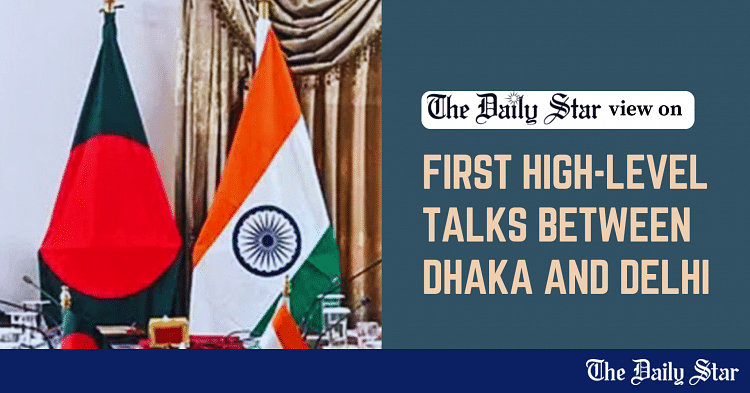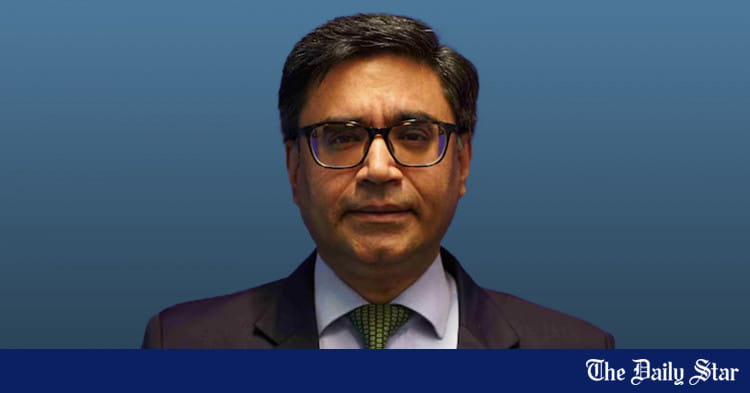What will the basis of India's new relations with Bangladesh be?
Selim Raihan
Updated: 10 Dec 2024, 22: 24
Demonstrations in Dhaka against anti-Bangladesh campaigns in India Prothom Alo
Bangladesh and India relations are important and multidimensional, strongly linked to the history, geography and culture of the two countries. Historically speaking, this relationship has gone through a lot of ups and downs. While there are many examples of friendship, cooperation and mutual support, these relations are marred time and again by suspicion and mistrust, complicating the way ahead.
In recent times the political change in Bangladesh brought about by the July-August mass uprising, along with regional and international reactions, had taken this suspicion and mistrust to a new height. Various messages and attitudes conveyed in different political, diplomatic and media contexts are affecting the balance of relations between the two countries. As a result, a challenge looms large to building up sustainable and trustful relations on the basis of fairness and equality.
Maintaining communal harmony is not simply the responsibility of the government. The civil society, the media and religious leaders also have an important role in this process
Need for fairness and multidimensionality
Bangladesh and India's relations are not restricted to the political arena alone. This is important on an economic, cultural and geographical scale too. In this context it has become imperative for the Indian government as well as the major political parties over there to evaluate the political change in Bangladesh in a dispassionate and realistic manner and to accept the reality sprouting from the July-August mass uprising. This evaluation must not be biased towards any one particular political party, but their priority should be towards building a multidimensional, deep and inclusive relationship with the people of Bangladesh.
However, it is unfortunate that in recent times certain media in India have been running a smear campaign against Bangladesh, openly supporting the fallen fascist government, presenting false information and publishing exaggerated news. This has created an obstacle to objective and dispassionate analysis. As a result, the complexities in relations between the two countries are growing. The recent attack on the Bangladesh assistant high commission in Tripura, India, has made matters worse. This is a condemnable incident that has damaged diplomatic relations between the two countries. The Indian government must certainly take speedy and effective measures to ensure that such an incident is not repeated.
In the meantime, Bangladesh too should focus on establishing relations with Bangladesh on the basis of fairness and mutual respect. In this context it is important to jointly search for ways to resolve the longstanding unresolved issues between the two countries, such as sharing of river waters, halting border killing, easing bilateral trade and investment and improving communications.
It is also important for the Bangladesh government and political parties not to create a cheap anti-Indian space in bilateral talks with India or in protests. It is vital in the interests of upholding Bangladesh's long-standing interests to adopt a responsible and mature stance in the matter of relations with India. Cheap India bashing may boost the interests of certain political groups, but this will never be conducive to the welfare of the Bangladesh people.
Protecting religious minorities: Shared challenge
Concern regarding the rights of the religious minorities in Bangladesh and India is a deep-rooted problem that exists in the social and political structures of both countries. In both countries the minority communities at various times have faced discrimination, oppression and a shrinking of rights. It is imperative for the state to take measures and have a well-planned policy to end such discrimination. But this problem often becomes the centre of political debate, obfuscating the actual way to a solution and the actual roots are not reached.
The minority communities in both countries want equal rights, security and dignity. They do not want to become tools of any particular political group. With this in mind, particularly in context of the recent political change in Bangladesh, one of the most important responsibilities of the interim government should be to ensure the security of the minorities.
It is imperative to be alert against activities of any groups within the country or outside that may harm communal harmony. Such groups do not only put the country's internal stability at risk, but also have a negative impact on international relations. For example, if communal agitation increases in Bangladesh, this may find reflection in India and in the same manner, India's situation can have an impact on Bangladesh's internal situation.
The fact remains that narrow-minded communal groups create intolerance and divisions in both countries. They are not satisfied with creating problems in their own countries alone, but influence and inspire each other. The governments of both countries must sternly control the activities of such groups and take effective measures to this end.
Maintaining communal harmony is not simply the responsibility of the government. The civil society, the media and religious leaders also have an important role in this process. The leadership of both countries must unitedly take initiative to ensure that the rights and the security of the religious minorities. It is also imperative to build up a humanitarian and tolerant environment or dignity where everyone can live safely with their own identities.
Such a tolerant and inclusive environment is not only conducive for minorities, but is very important for the overall social stability and development of both countries. This is a historical opportunity for both countries to set up an example of religious harmony and respect for human rights by means of mutual cooperation and to build up a future.
Using new possibilities
It has become absolutely imperative for Bangladesh and India to build up multidimensional and balanced relations. From the perspective of deep ties of geography, history, culture and economy, these relations can be rendered sustainable and dynamic to ensure the socioeconomic welfare of the people of both countries. This is not just essential, but imperative for the overall development and regional stability of both countries.
The present times in Bangladesh, particularly in the time after the July-August mass uprising, stands as a big challenge to the political parties, civil societies and the media of both the countries. This has brought forward the need to reevaluate the old strategies, narrow viewpoints and one-sided decisions. At the same time, fresh opportunities have arisen to open the doors to a new and positive bilateral relationship.
Now the time has come to put this opportunity to use. Both sides should try to find joint solutions to the unresolved problems on the basis of fairness and mutual respect. If this opportunity is not taken up, then the communal forces will slip in through the gaps and try to make the situation murky. Such groups create a block to peaceful coexistence and long-tern partnership between the two countries.
Their instigative activities exacerbate the problems rather than resolving them. This is harmful to the development and growth of both countries. That is why Bangladesh and India must make concerted efforts to start a new chapter. It is not the responsibility of political leadership alone but of the civil society, academics and the media to create a positive environment. This will not generate a feeling of hope within the country, but will establish and model of relations of peace and cooperation in the greater region of South Asia.
The leadership of both countries should ensure socioeconomic development of the people by means of far-looking and realistic policies. Narrow, one-sided viewpoints should be dropped and bilateral relations taken ahead on the basis of sincerity, mutual respect and cooperation. This is not just a matter of tackling the present challenges, but will facilitate a bright future for both countries.
*Selim Raihan is a professor of economics at Dhaka University and executive director, SANEM. He may be reached at
selim.raihan@gmail.com
*This column appeared in the print an online edition of Prothom Alo and has been rewritten for the English edition by Ayesha Kabir







































